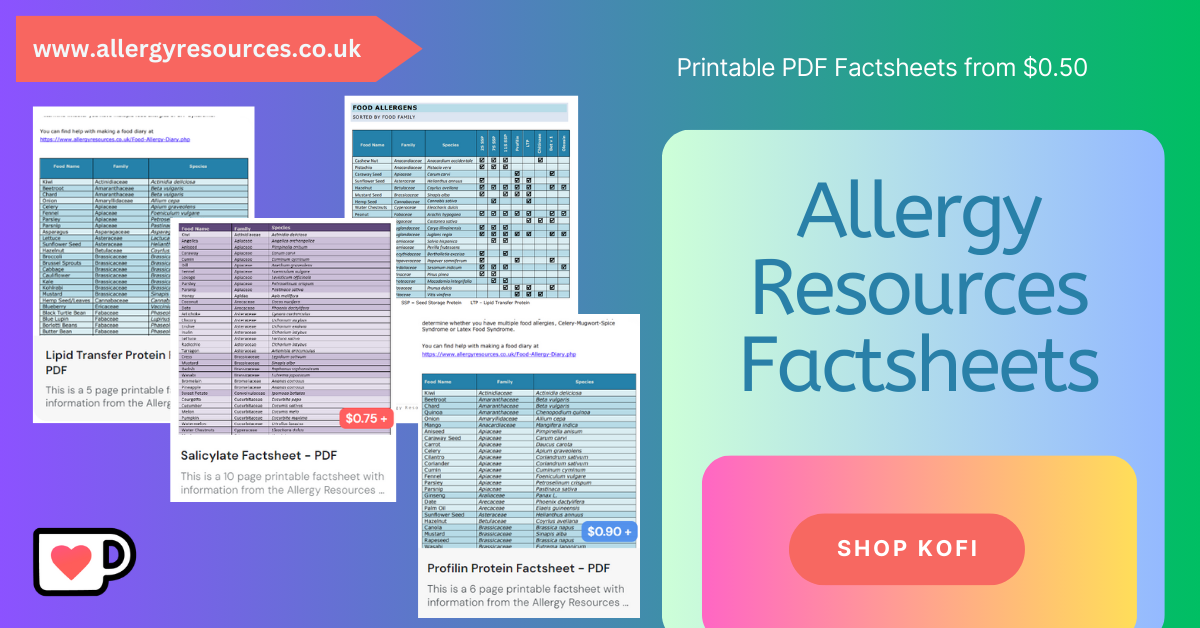
CASHEW ALLERGY
Key Allergens
There are three allergens associated with cashew allergy.
Ana o 1 is a vicilin like protein, also called a 7S seed storage globulin protein. 7S globulin proteins are involved in the hydration processes of plant cells and are important for breakdown during germination.
Ana o 2 is a legumin like protein, also known as a 11S seed storage globulin protein. 11S globulin proteins are involved in storage of nutrients in the plant.
Ana o 3 is a 2S albumin protein which are found in most nuts and some seeds and cause people to be allergic to whole groups of tree nuts.
There was a study in 2020 which showed cashews contained a Class VI chitinase protein. Cashews are strongly linked to peanut allergies as they both contain all 3 types of seed storage proteins, giving a lot of potential for cross reactivity.
Food Intolerances




Cashews are low in salicylates, so are suitable for people who follow a low salicylate diet.
Cashews are low in histamine, so are suitable for people following a low histamine diet.
Cashews are a high FODMAP food. FODMAP stands for Fermentable oligosaccharides, disaccharides, monosaccharides and polyols. Foods high in FODMAPs can cause symptoms of food intolerance, affecting the gastro intestinal system and this can be mistaken for a true IgE food allergy.
Cashew contains a moderate amount of lectins, another cause of food intolerance. Cooking foods with lectins makes them more digestible and can reduce the symptoms of food intolerance.
You can read more about Food Intolerances on the dedicated Food Intolerance Page.
Associated Syndromes
Cross Reactivity
Other foods containing 7S seed storage proteins not mentioned above are coconut, lentil, lupin, macadamia nuts and peas.
Almonds contain 11S seed storage proteins and are not included in either of the above lists. Visit the 11S seed storage globulin protein page for the extensive list.
Other foods containing chitinase include pomegranate, kiwi, corn, avocado, banana, chestnut, coffee and tamarind.
You can download a Tree Nut Allergy Factsheet from the Allergy Resources Ko-fi Shop for just $0.90 (£0.69 or €0.82). This has up to date information on which foods contain linked allergens and what foods to avoid if you think you have an allergy to tree nuts.
Note these food lists are not exhaustive. The most up to date information is on the Cross Reactivity Tool.
Resources
Websites
Allergen Encyclopedia - Cashew Nut
What Are the Symptoms of a Nut Allergy?
Allergy UK - Quick Guide to Tree Nut Allergy
Anaphylaxis Campaign - Peanut and Tree nut allergies
Can You Be Allergic to Just One Type of Tree Nut?
Anaphylaxis Campaign - Cashew Nuts
Allergy information for: Cashew (Anacardium occidentale)
ATP Science - Salicylate Foods
Articles and Journals
Pistachio Oral Immunotherapy to Induce Cashew Desensitization In Pediatric Patients, 2025
A case of cashew nut related citrus seed allergy with suspected citrin involvement, 2024
Can cashew nut allergy resolve spontaneously? 2024
Prevalence of tree nut allergy in Europe: A systematic review and meta-analysis, 2024
Tough Nut to Crack: Transplant-acquired Food Allergy in an Adult Liver Recipient, 2023
Feasibility and safety of introducing cashew nut spread in infant diets—A randomized trial, 2023
Tree nut introduction in infants with peanut and/or egg allergy, 2023
Optimizing tools for evaluating challenge outcome in children with cashew nut allergy, 2021
Ana o 3 sIgE testing increases the accuracy of cashew allergy diagnosis using a two-step model, 2021
No cashew allergy in infants introduced to cashew by age 1 year, 2021
Current perspectives on tree nut allergy: a review, 2018
2S Albumin Storage Proteins: What Makes them Food Allergens?, 2008
Cashew nut causes more severe reactions than peanut: case‐matched comparison in 141 children, 2007
Ana o 3, an important cashew nut (Anacardium occidentale L.) allergen of the 2S albumin family, 2005